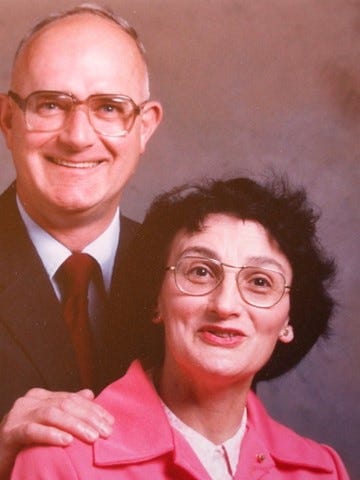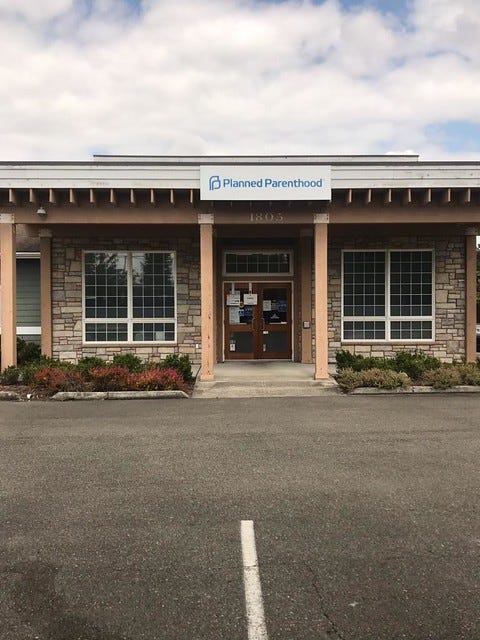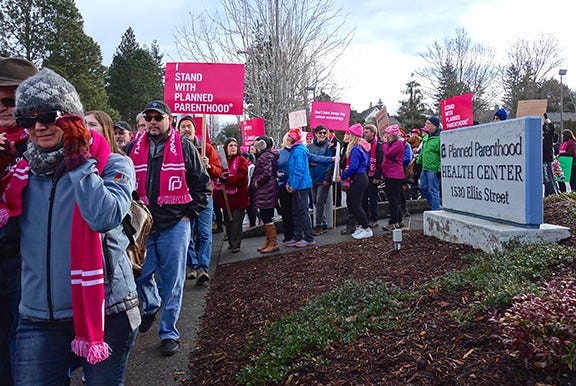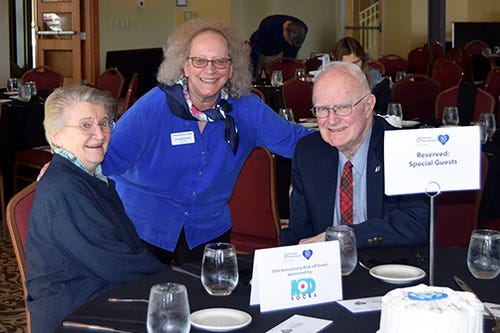A History of Choices
How the Mt. Baker Planned Parenthood came to be
Story By Lauren Gallup
At the intersection of Ellis and York is a crossroads between anti-abortion protestors and those seeking service at the Mt. Baker Planned Parenthood. Horns honk as cars drive by — sometimes in support, sometimes in opposition — at the handful of people who stand outside the clinic, with signs saying things such as “Dad for babies,” “Pro life is pro women” and “Love both sides.”
Around the corner, cars pull into the fir tree-lined parking lot and Bellingham residents get out to access the plethora of health services offered inside the clinic.
Linda McCarthy has been working at the Mt. Baker Planned Parenthood since 1977. She started there as a secretary, after moving out west from Massachusetts. At the time, she didn’t even know what Planned Parenthood was. Now she’s the CEO of the clinic.
In her 43-year career with the organization, McCarthy has seen a lot of change when it comes to women’s reproductive health.
In the 1960s and ’70s, women got more bodily autonomy as well as the rights they deserved, McCarthy said. This female empowerment movement was marked with landmark decisions for reproductive health, such as the Supreme Court ruling of Roe v. Wade in 1973 that made abortion legal across the United States. It had been legal in Washington state for three years prior.

The clinic itself has grown over the years. It was started in 1969 by two Western professors — Charles and June Ross — as the Family Planning Association of Whatcom County.
“June had a really good student and because of an unexpected pregnancy, [the student] had to quit school,” Charles Ross said over a phone call. Ross said his late wife June thought this was a shame, that such a successful student should have to quit school because of an unplanned pregnancy.
Desiring a better outcome for other students, and unsatisfied with the options around town at that time, the two took matters into their own hands. They started hosting community meetings to discuss the need for a family planning clinic.
The support was evident from the get-go. Ross said they would have about three dozen community members at each meeting. Students encouraged and frequented the meetings, Ross said.
Ultimately, the Rosses wanted a brick and mortar establishment where people could access services. They liked the mission and operation of Planned Parenthood, but affiliation with the closest one in Seattle wasn’t an option, as they would only be available to help once a week, on Tuesdays at 4 p.m., Ross explained.
Ross did what many of us do when we don’t know what to do. He called his mom.
It makes sense that the man who started what would become the Mt. Baker Planned Parenthood would have a mother who championed reproductive rights. She had always been active at the Champaign-Urbana Illinois Planned Parenthood, Ross said.
A day after he called looking for advice, she got back to him with a list of phone numbers and people to call. If the Seattle branch wasn’t their way in, the Rosses would start their own.
A year later, the clinic became an affiliate of Planned Parenthood called Planned Parenthood of Whatcom County. June Ross served as the first director of the clinic, which was located in the former St. Luke’s hospital.
After a year, McCarthy said the clinic moved to the health department building at 500 Grand Avenue, before moving to its current location on Ellis Street in 2005.

The reach of the Rosses’ initial clinic has extended over the years. 1980 saw an increase of services in Skagit County with the Mount Vernon Health Center, and the Bellingham clinic changed their name to Mt. Baker Planned Parenthood. In 1995, services were added in Friday Harbor with the Friday Harbor Health Clinic.
The Bellingham clinic was the “papa bear” of these two smaller clinics, according to McCarthy. All three provide an extensive list of services to anyone in the community who needs it, including cervical cancer screenings, HIV services, and routine checkups for all genders.
The dream of the Rosses to have family planning services available to their community had come true.
Western students have continued to grow their relationship with the clinic. Planned Parenthood Generation WWU, is a campus club that partners with Mt. Baker Planned Parenthood to help educate students and give them a voice to advocate for their health and their community, Jessica Hay said, who oversees the program. Where once there was a gap in reproductive health information at Western, the club connects students to resources.
“Students are learning about the health care they deserve, about how to keep themselves and their community safe, and how to advocate for what they believe in,” Hay explained. “This only happens because of the strong partnership between the PPGen club and the Western community.”
For as much support that the clinics have received, there have always been those opposed to it. The opposition to clinics such as Planned Parenthood and reproductive care is evident in the protestors who picket outside their building every day, harassing patients as they go to seek care. McCarthy said the protestors have been around since probably the ’80s, before the clinic even began offering abortions in 1999.
The protestors usually stand along the backside of the clinic on York Street, where security cameras point down along the wall and a faded “Private Property No Trespassing,” sign is hung.
McCarthy addressed the hypocrisy in those who oppose women’s reproductive rights. “They want abortion to be illegal, except for rape, incest and [themselves],” McCarthy said.
In the early 2000s, a man and his daughter came into the clinic, McCarthy recalls. The staff immediately recognized him as a frequent picket line participant outside their doors. He had brought his daughter in to get an abortion.
“What is the deal here?” McCarthy remembered asking him. “You know, you harass our patients every day, and here you are now, making use [of the services].”
His reply was that he didn’t want his daughter to “ruin her life.”
McCarthy and the rest of the staff were aggravated by the man’s ability to see why abortion might be a good option for his daughter, yet be so adamantly against it for others.
Ultimately, the girl did not have an abortion, because she didn’t want one. And that’s what McCarthy expressed as the ideology behind Mt. Baker Planned Parenthood, allowing members of the community to make their own choice about their bodies.

McCarthy has seen legislation that has expanded care options in Washington. In July 2000, Washington established Take Charge, which provided family planning resources to those who didn’t qualify for Medicaid or have insurance. McCarthy said it was “phenomenally successful.”
In July 2019, Take Charge became Family Planning Only, which made it so any Apple Health provider could provide family planning services to qualified clients. The program, housed under the Health Care Authority of Washington, covers different statuses of eligibility for the same care, including FDA approved contraceptives, vasectomy procedures, and a year supply of birth control, explained Beth Tinker, a clinical nurse consultant with the HCA.
These things correlate with more options when it comes to family planning. When you look at the data, you see “the rise in the highly effective contraceptive use and the drop in the unintended pregnancy and abortion numbers,” McCarthy said.
Although family planning has grown in Bellingham and the surrounding areas since the Rosses first started the clinic, federal impacts have threatened progress. Four years ago, when President Donald Trump was first elected, McCarthy said they had many patients coming in concerned that access to their care would suddenly go away.
“We had a run on our services that we had never seen before,” McCarthy remembered. “We had six, eight-week waiting lists.”
Their fears weren’t unfounded. Under the Trump administration, there have been setbacks to reproductive health, and specifically to Planned Parenthood’s work. The biggest, McCarthy said, that “[Trump] defunded Planned Parenthood out of the Title X program.”
Title X is a federal grant program which began in 1970 that provides access to family planning and preventative health care, according to Physicians for Reproductive Health.
The Washington State Department of Health picked up the funding, to ensure continued access to care in Washington.
Other states have yet to pick up this funding, however.
“It’s just playing politics with real people’s lives and driving people into poverty.” McCarthy said “And, you know, that’s just a vicious cycle and it’s something that we should all be ashamed of.”
Right now at the clinic, the focus is COVID-19. They started doing telemedicine — something they’d been thinking about for years — within eight days after the statewide lockdown in March to offer care to patients virtually, McCarthy said.
Of course, many of the services Planned Parenthood offers require patient-provider contact. Luckily, the clinic has been able to stay open this whole time. McCarthy said that when things began closing down in Washington, Gov. Jay Inslee specifically stated that family planning practices contracted with the Department of Health, like Planned Parenthood, would stay open.
Pregnancy is a high-risk factor for COVID-19, making proper access to care even more important right now, McCarthy said. In Bellingham, Mt. Baker Planned Parenthood continues to provide critical services so everyone can receive the care they need during these uncertain times.
Even though the Trump administration is coming to an end, his governance could still have lasting effects on access to reproductive care. The Supreme Court — which now has a 6–3 conservative majority — began hearing the case that the Affordable Care Act is unconstitutional on November 10.

Charles Ross continues to support the clinic he and June started. He and his wife Ann Haushild now live in Minnesota. In 2019, when the clinic celebrated their 50th anniversary, Ross and Haushild attended the celebration, and Ross said it was nice to see the place doing well. He said the clinic had “expanded to an almost permanency” — referring to the continued opposition Planned Parenthood faces from protestors and conservative politicians.
And no matter what happens at the federal level — “We’re not going anywhere. We’re going to be here for you. Failure is not an option for us,” McCarthy said.
